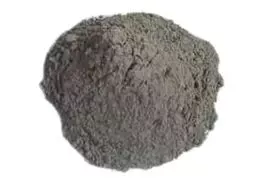
- General Product Name : Super Sulphated Cement
- Product Category : Cement
- Compliance Name : BIS / ISI Certification
- Indian Standard : IS 6909: 1990
Super Sulphated Cement (SSC) is a specialized type of cement known for its exceptional resistance to sulfate attack, making it particularly suitable for use in aggressive and sulfate-rich environments. SSC is created by blending finely ground granulated blast furnace slag (GBFS), calcium sulfate, and anhydrite, resulting in a cement with low heat of hydration and high resistance to sulfate ions, which can otherwise cause damage and deterioration in concrete. SSC is highly beneficial in construction projects involving structures like sewage treatment plants, marine environments, and other areas where the concrete is exposed to high sulfate concentrations, preventing the harmful effects of sulfate attack. While Super Sulphated Cement offers superior sulfate resistance, it may have lower early strength compared to other cement types, and its use is typically limited to applications where sulfate resistance is of utmost importance. This specialized cement plays a vital role in ensuring the durability and longevity of concrete structures in challenging environments prone to sulfate-induced degradation.
IS 6909:1990 for Super Sulphated Cement (SSC) is an important standard in the construction and building materials industry, especially in applications where resistance to aggressive environments and conditions is required. IS 6909:1990 focuses on providing resistance to aggressive environments, particularly those with high levels of sulfate attack and chemical exposure. It sets specifications and requirements for SSC, ensuring that the cement produced is of consistent and dependable quality. SSC meeting this standard provides builders, engineers, and industries with confidence that it will perform reliably in aggressive environments. Compliance with this standard is essential for cement manufacturers to export their products in India and maintain legal compliance.
Note: Foreign manufacturers of Super Sulphated Cement are required to obtain the mandatory BIS/ISI Certification to export their products to the Indian market.
BIS/ISI Certification is a critical requirement for foreign manufacturers aiming to export Super Sulphated Cement to India. This certification, mandated by the Indian government, is of utmost importance to ensure that the cement meets the country's specific technical and safety standards, guaranteeing its quality, performance, and compliance with local regulations. Without BIS/ISI Certification, foreign manufacturers are legally restricted from marketing or distributing their Super Sulphated Cement in the Indian market. The certification process is meticulously designed to ensure that the imported cement adheres to stringent quality benchmarks, chemical composition requirements, and the presence of super sulfated material, which is essential for its properties, including resistance to aggressive chemical environments, making it vital for specialized construction applications in India.
The BIS/ISI Certification is a hallmark of product quality and safety in India, administered by the Bureau of Indian Standards (BIS). Established in 1987, BIS is a statutory body under the Bureau of Indian Standards Act 1986, responsible for setting, maintaining, and ensuring compliance with standards across various sectors. It upholds the legacy of the Indian Standards Institution (ISI), founded in 1947 and introduced the ISI mark as an emblem of quality. BIS continues this legacy by formulating standards and granting BIS/ISI Certification to products that meet the stringent quality and safety criteria defined by the organization. The Bureau of Indian Standards has been operating the Foreign Manufacturers Certification Scheme (FMCS) since 2000, as per Scheme-I of Schedule-II, BIS Act, 2016, and (Conformity Assessment) Regulations, 2018, specifically designed for foreign manufacturers. This scheme empowers international applicants and manufacturers to utilize the ISI Mark for exporting their products in India. The exclusive authority responsible for awarding the BIS Certificate for imports to foreign manufacturers is the Foreign Manufacturers Certification Department (FMCD). The primary objective behind BIS providing Manufacturing Certificates to foreign manufacturers is to ensure that the public in India has access to high-quality, safe, reliable, and risk-free products.
Complete your BIS/ISI Certification process by following these steps:
Step 1: Application Submission
- Gather all required documents
- Submit documents and the Application Fee
- Receive the Application Number
- Scrutinize the Application within the specified time frame
Step 2: Query Raised (If any)
- Receive communication about any missing documents or non-compliance
- Respond within the given period
For more detailed information, please click here.
Here is the list of documents required for foreign manufacturers for BIS/ISI Certification in India:
● Main Application Form V - (View / Download)
(Primary factory and product category information)
● ISI Application Fee - (View / Download)
(Copy of Remittance / Payment Advice)
● In-House Laboratory Test Report
(Indicating product compliance with the relevant Indian Standard, conducted within one month)
For more detailed information, please click here.
Export Approval, powered by Brand Liaison, is a single platform solution for various product certifications and approvals in India. We are one of the leading compliance consultant that provide essential Indian certification services to manufacturers to export their products to India. Our services include:
- Comprehensive support for paperwork, testing, and guidance.
- Sample development meeting standards for complete conformity in testing labs.
- Detailed application preparation and timely query responses.
- Free license maintenance for 2 years.
Download Brochure
Process & Guidelines